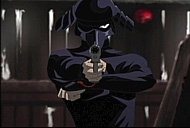
Samurai Gun Vol. 1
I've always been a James Bond fan. When I was a kid, I thought all the incredible gadgets were way cool. I mean, who wouldn't want a minijet to get to school or a watch that cut through steel and located nuclear bombs at the same time? Of course, none of those items ever really existed except in the minds of the filmmakers (and occasionally in the head of Ian Fleming, his creator). But what if the Bond adventures skipped the glitzy stories of a modern secret agent, transplanted the wild thingamajigs into the last days of the Shogunate, and focused on a reluctant warrior living in a world with tons of anachronistic weaponry? That's ultimately the scenario behind Samurai Gun, an uneven but entertaining release from ADV Films. If the show weren't so dark in tone, seeing a ninja warrior with an Uzi or a bad guy with a rocket pack would be cause for laughs. But Samurai Gun is a deadly serious show that stands out because it doesn't play up the absurd elements; instead, it takes them for granted. It does come close to my tolerance threshold for sex and violence, and I'm not sure it quite works, though I'd probably watch another disc to find out.
Samurai Gun follows the tale of Ichimatsu, a one-eyed warrior with a distaste for killing but a desperate look in his eyes that betrays his desire for revenge on those who slaughtered his family in front of his eyes years ago. He hangs around in the red light district, though he only visits one girl named Ohana and never even touches her, just wanting a friend. But what makes him a truly dangerous character is his skill with a pistol (despite the lack of depth perception from lacking an eye, I guess). He's recruited for a number of missions to hunt down killers and other nefarious characters indiscriminately murdering throughout the countryside. Though he says he doesn't want to be involved, when true justice needs to be served, he's the go-to guy. But certain Shogunate forces want to put down these vigilantes, forming an Anti-Samurai Gun legion. And with all sorts of new technology at their disposal, they have the means to stop Ichimatsu and his friends from keeping their own sense of order in this bizarre alternate Japan somewhere around the turn of the 20th century.
The animation feel of Samurai Gun is a mixture of splattery samurai horror OVAs released in the '90s and popular programs like Cowboy Bebop and Samurai Champloo. The artwork itself, however, doesn't stand up to either of those two programs; it's a bit less complicated, though enjoyable enough to watch. The music is all over the map, with a bit of hard rap rock starting it off and a standard ballad closer, but the score for the episodes themselves was actually quite good. There is a certain inconsistency, as the soundtrack does flip from orchestrated numbers to upbeat rock at times, but overall the score enhanced the show considerably.
There's a "kitchen sink" mentality to Samurai Gun that is at once invigorating and infuriating. Ichimatsu is a reluctant hero who sounds like Shin Kazama from Area 88 in insisting that he doesn't want to kill any more, but it really doesn't take much to get a gun in his hand. He flips back and forth from sullen loner to Han Solo rogue. Although we get his backstory almost immediately, his characterization is enigmatic. Whether this is intentional or simply laziness will likely be determined by whether or not Ichimatsu's character shows any growth over the remaining nine episodes of the series. On the other hand, the third episode focuses on Ohana, and though her tale of life as a forced prostitute isn't unique, its telling proves that the Samurai Gun crew can provide compelling stories in this backdrop. Although we don't learn a lot about each of the principle characters, what we do discover about Ichimatsu's friends makes them more than ciphers. If the first volume of Samurai Gun had focused more on characters rather than on gory action, I would have been more impressed.
However, this show dwells a little too long in the land of the brutal and grotesque, and the sensitive should stop reading and find something else to watch. Though by no means as gory or unsettling as the recent Gantz or Elfen Lied, Samurai Gun has a large share of violence for violence's sake. Going back to the Bond analogy, virtually every enemy here turns out to be a raving psychopath that makes most of the loony villains in the Bond series look placid by comparison. I mean, these are leering, jeering, over-the-top sadists who get their kicks from hunting down, torturing, and otherwise abusing women. Granted, one of Ichimatsu's companions is a woman who can take care of herself, but most of the women depicted here are busty victimized whores. With loads of blood and lingering shots on dead bodies, there's a cruelty here that's unnecessary. There's no nudity, but there are still explicit silhouetted sexual situations on display that make this a show for grown-ups only. Finally, the sub and dub give you quite different programs. There are a couple of profanities and an occasional crude joke in the sub, but the dub is rife with all sorts of really harsh language. As a result, the tone changes, making the dub darker and nastier. Be warned.
On to the final big question of Samurai Gun...does the anachronism of the show hurt it? Only if you're expecting a show about sleek men with sharp swords. Frankly, I thought the intermixing of steam engines and automatic weapons with the history and concept of pre-industrial Japan was unique and entertaining. Some will find it silly, but if you can suspend your disbelief, it works. Yes, it's an alternate universe. So what? Science fiction doesn't have to have a monopoly on speculative histories, whether future or past. But admittedly, going in aware of the scenario does make it a more comfortable experience.
The first volume of Samurai Gun left me personally conflicted. The leads have potential, and if the relationship between Ichimatsu and Ohana is explored and grows, I'd be most happy. The conflict between Ichimatsu and the Anti-Samurai Gun forces could also prove to be worthwhile. But if they continue to tell these gruesome side stories about crazy killers in the woods, I won't be around for too long. Unlike the previously mentioned Gantz and Elfen Lied, there really isn't a mystery to be solved or another compelling reason to keep watching through some offensive elements. I'm going to give this one a low recommendation because I did enjoy most of it for what it is, but whether I'll finish the series is a question of where it proceeds from here.
Samurai Gun Vol. 1 -- graphic violence (particularly towards women), profanity/crudity (PG-13 in the sub, R in the dub), sexual situations, rated TV-MA -- B-

